Rebirth of the Kročehlavy Brewery
In my recent #beersaturday posts, I've presented breweries with centuries of history behind them, some almost literally resurrected from the ashes by local patriots. Beer deeply intertwines with Czech culture; we've been recognizing local breweries as keen social hubs since ever. This characteristic turns us into beer connoisseurs and exposes us to the risk of alcoholism. This time, I will guide you through a brewery currently experiencing its rebirth. It's in the Kročehlavy district of Kladno, a town that nowadays functions mainly as a residential area for those who prefer to avoid living in Prague. However, Kladno once held a prominent position as an industrial hub with massive coal mines and Poldi, a significant steelwork established in 1889. The Kročehlavy brewery, however, predates even these and carries spiritual connotations. Let me take you there!
V minulých článcích pro #beersaturday jsem vás pozval do několika pivovarů s mnohasetletou historií, které byly téměř doslova vzkříšeny z popela místními nadšenci. Pivo je jedním ze základních stavebních kamenů české kultury, a tak není divu. Což z nás ovšem dělá nejen pivní znalce, ale taky potenciální alkoholiky. Tentokrát vás vezmu do pivovaru, který svou obnovu teprve prožívá. Je v kladenské čtvrti Kročehlavy asi dvacet minut od Prahy. Jak určitě víte, Kladno bylo důležitým průmyslovým centrem s Poldovkou a uhelnými doly. Ale pivovar Kročehlavy je ještě o něco starší než Poldi založená v roce 1889, a navíc má tak trochu spirituální konotace.
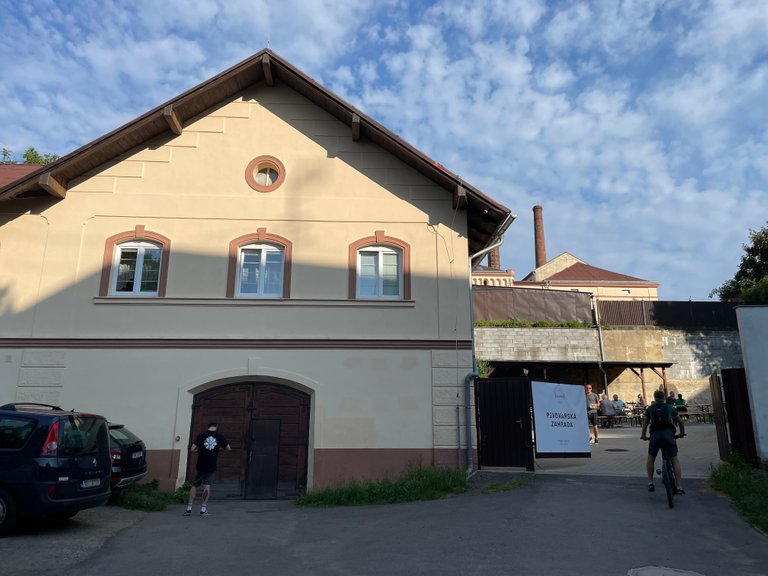
The brewery was founded by the Benedictines, a Catholic religious order. They'd been running another brewery in Břevnov, Prague, since 993, but for some reason, they decided to produce more beer in a modern establishment. So, they began constructing a vast complex with a brewery, a malt house, a mill, several maintenance buildings, stables, a water tower, and even a couple of residential houses. The monks indeed thought big! Construction commenced in 1855, and the first batch was brewed just three years later. Praise God!
Pivovar založili Benediktinští bratři z Břevnovského opatství. Tam mimochodem provozují od roku 993 jiný pivovar, o kterém tu, myslím, nedávno psal @phortun. Mniši se rozhodli, že potřebují vařit více piva modernějším způsobem. A vzali to opravdu vážně, v roce 1855 začali stavět velký komplex s pivovarem, sladovnou, několika dalšími budovami, stájemi, vodárenskou věží a dvěma obytnými domy. První pivo přesto uvařili už o tři roky později. Dej Bůh štěstí!
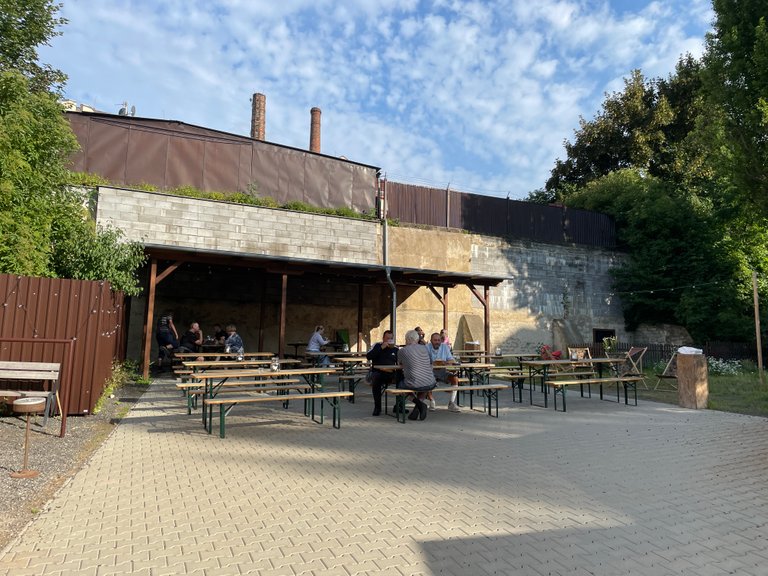
Two decades later, the brewery got a modern steam engine, and the monks started leasing it to private entrepreneurs. From 1873 to 1914, ownership passed through various hands, and the brewery morphed into a cultural center for Kročehlavy, where local art collectors would gather and political leaders would discuss the pressing need for increased independence from the Austro-Hungarian empire, soon to dissolve in the aftermath of WWI. Speaking about the war, like many other local breweries, this one too faced challenges during it.
O dvacet let později dostal pivovar moderní parní stroj a mniši jej začali pronajímat. Mezi léty 1873 a 1914 vystřídal řadu provozovatelů a stalo se z něj kulturní centrum kročehlavské honorace. Scházeli se tu sběratelé umění i političtí buřiči, kteří by rádi získali větší nezávislost na habsburské monarchii. Naštěstí se rozpadla hned po první světové válce. A když už jsme u té války, stejně jako jiné pivovary, o nichž čas od času píšu, i tomuhle se během ní příliš nedařilo.
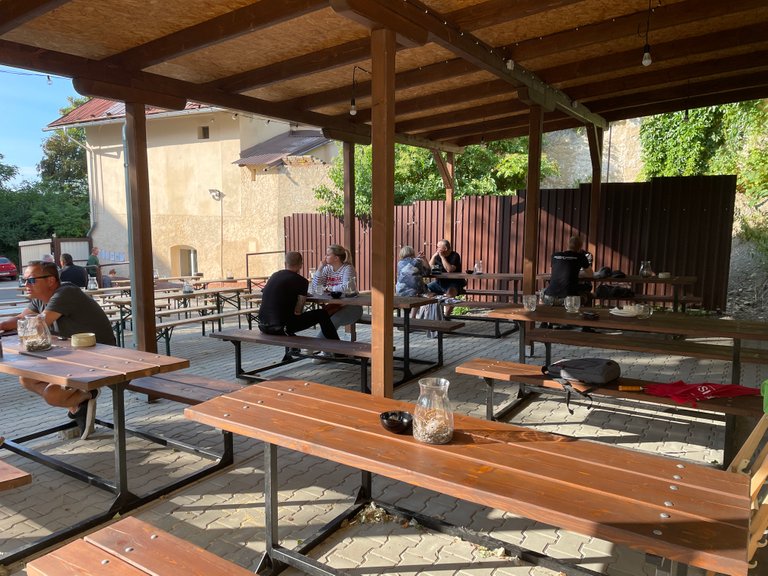
The interwar period didn't treat the brewery as kindly as the previous pre-war decades. Production dwindled to about half of its previous volume. Despite this, the Benedictines retained ownership, renting the entire venue. During WWII and the Protectorate, the brewery was plagued by shortages and bureaucratic hurdles until it finally halted production. The production resumed in 1945.
In 1948, when the communists took control of Czechoslovakia, the brewery was inevitably confiscated, given their aversion to both the Church and private entrepreneurship. The complex was soon repurposed into a warehouse for a local agricultural company and later for one of Poldi's subsidiaries.
Ani meziválečné období nebyla tak úplně procházka růžovou zahradou. Výtoč pivovaru byla zhruba poloviční. Benediktini nicméně komplex stále vlastnili a úspěšně ho pronajímali. Za druhé světové války měl pivovar problémy s výpadky dodávek surovin i byrokracií, která mu házela klacky pod nohy, až nakonec pivo vařit přestal. Další várka byla uvařena až po konci války.
Když se moci chopili komunisté, soukromí podnikatelé spravující církevní majetek pro ně byli jako rudý hadr pro býka. A tak byl komplex zabaven a stalo se z něj nejprve skladiště pro JZD a později pro nějaký průmyslový podnik, snad dodavatele Poldovky.
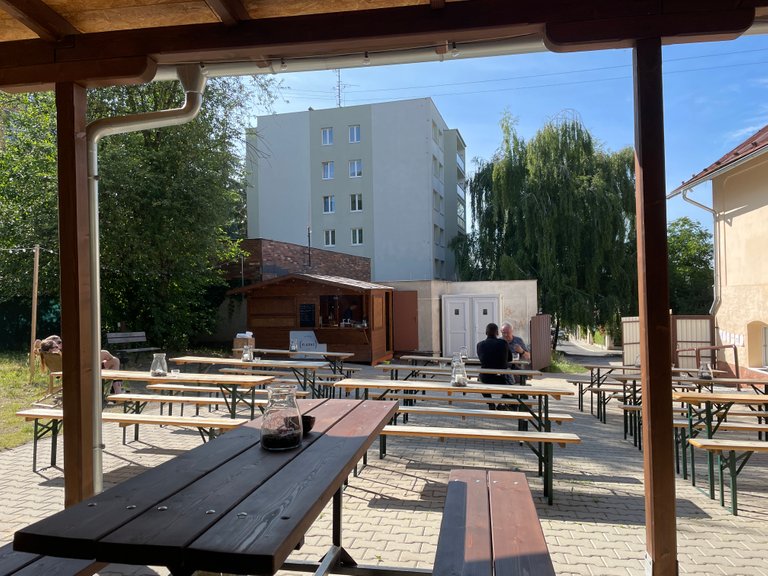
The property, largely reduced to ruins after years of neglect, was returned to the Benedictines in 2003, following over a decade of legal disputes. While the order had no desire to manage the venue, the monks attempted to rent or sell it. Over the past 20 years, most buildings have been at least partially renovated and now serve as offices or warehouses. Happily, one building still serves its original purpose - the brewery. The first new batch after 71 years of closure was brewed in 2021. For the last two years, you could only purchase bottled or canned beers there. However, this year, the gates of the Kročehlavy brewery were opened to the public, allowing you to step inside the yard and enjoy a pint or two (or ten, as we're Czechs, after all). The location has a somewhat punk feel, with portable bathrooms and no indoor seating, but it's just a matter of time before this changes. The brewery is saved!
Benediktini svůj majetek dostali zpátky až po dekádě soudních pří v roce 2003. A asi si umíte představit, v jakém mohl být stavu. Mniši se rozhodli, že pivovar rozprodají nebo pronajmou, vařit pivo v ruinách se jim nechtělo. Za dalších dvacet let tak byla většina budov alespoň částečně opravena a dnes jsou z nich kanceláře nebo sklady. Jedna budova si ale naštěstí svůj původní účel zachovala. Pivovar. První várka po dlouhých 71 letech byla uvařena v roce 2021. První dva roky se pivo prodávalo jen v lahvích nebo plechovkách z okénka, ale letos se brána znovu otevřela. A tak se můžete usadit na pivovarském dvoře a dát si pivo nebo dvě. Nebo deset, jsme přeci jen Češi, ne? Dvorek má trošku punkovou atmosféru, záchody jsou jen mobilní a není tu žádné interiérové sezení. Ale to je jen otázka času. Pivovar je zachráněn.
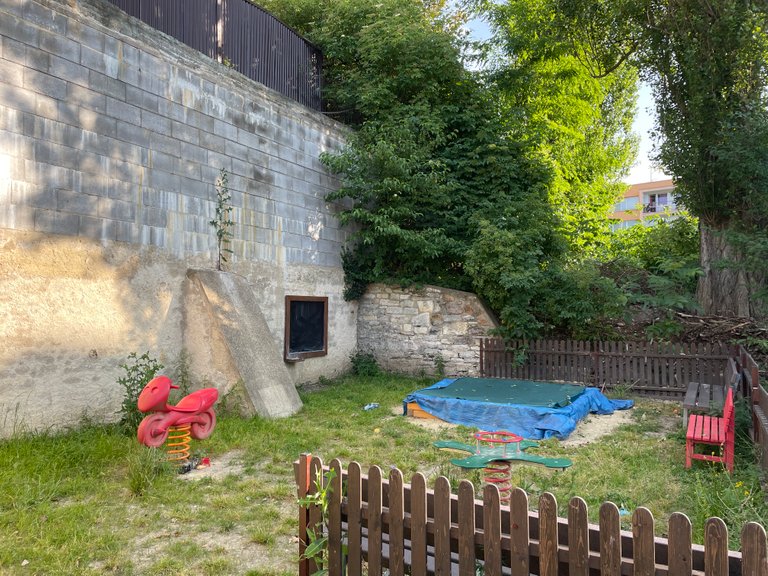
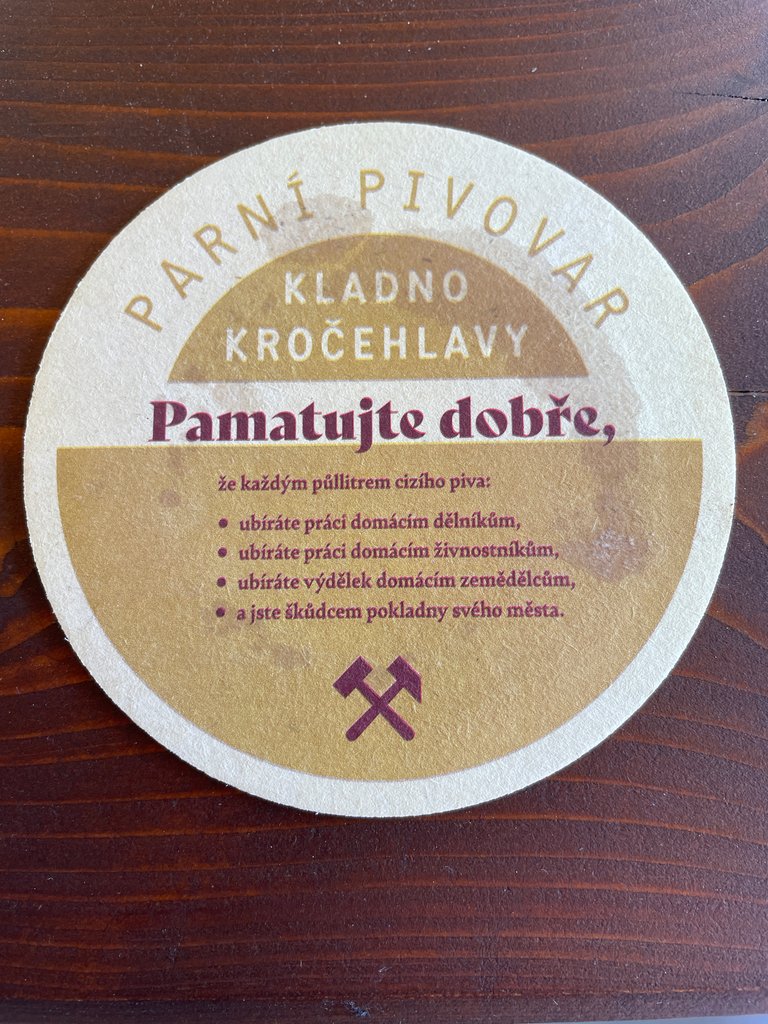
I really love this coaster. It says:
Remember well!
By every pint of foreign beer, you:
- take jobs away from our local workers
- take jobs away from our local small entrepreneurs
- cut off profits of our local farmers
- are harming our city budget
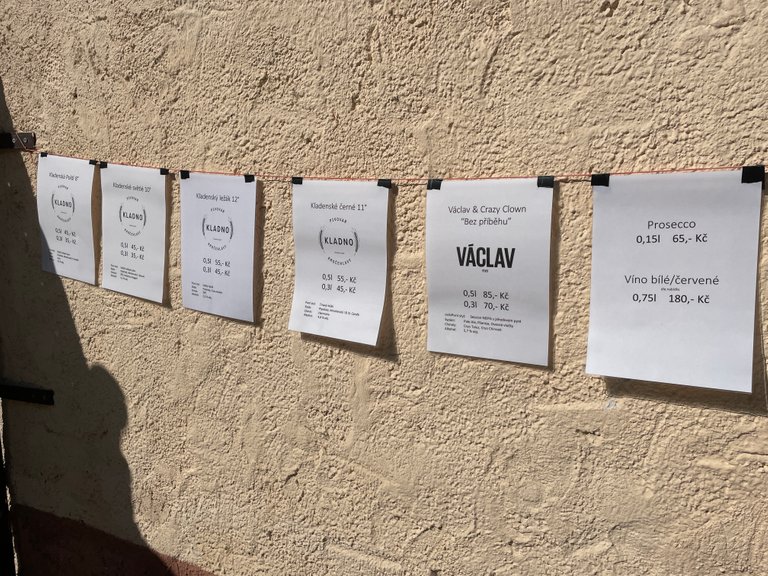
The Beers
Kladenské černé
This Czech-style dark lager is slightly weaker than usual. Owing to its lower malt content, it's not overly sweet, which in turn allows the roasted coffee notes to shine. These notes subtly waft in but maintain a long-lasting presence. I was a little surprised, but pleasantly so. The foam dissipated rather quickly, perhaps because it was the first glass drafted that day.
Tmavý ležák českého typu, který je o něco slabší, než bývá zvykem. Díky nižšímu obsahu sladu (je to jedenáctka) ale není tak sladký a dává tedy lépe vyniknout praženým kávovým tónům, které nastupují jemně, ale o to déle vydrží. Trochu mě překvapil, ale příjemně. Pěna rychle spadla, možná proto, že to byla první vytočená sklenice toho dne.

Kladenský ležák
This is a perfect Pilsner-style lager, just as one would expect. The Žatec hops impart a characteristic hint of spice to its bitterness, accompanied by interlacing malt notes. This results in a well-balanced and palatable brew. It's a quintessential example of the flavor profile that craft breweries should strive to achieve.
Pořádný ležák plzeňského typu, přesně jak má být. Žatecké chmely mu dodávají typickou lehce kořeněnou hořkost, do které se prolínají sladové tóny. Vyvážené a dobře pitelné pivo. Takhle by měly piva řemeslných pivovarů chutnat.
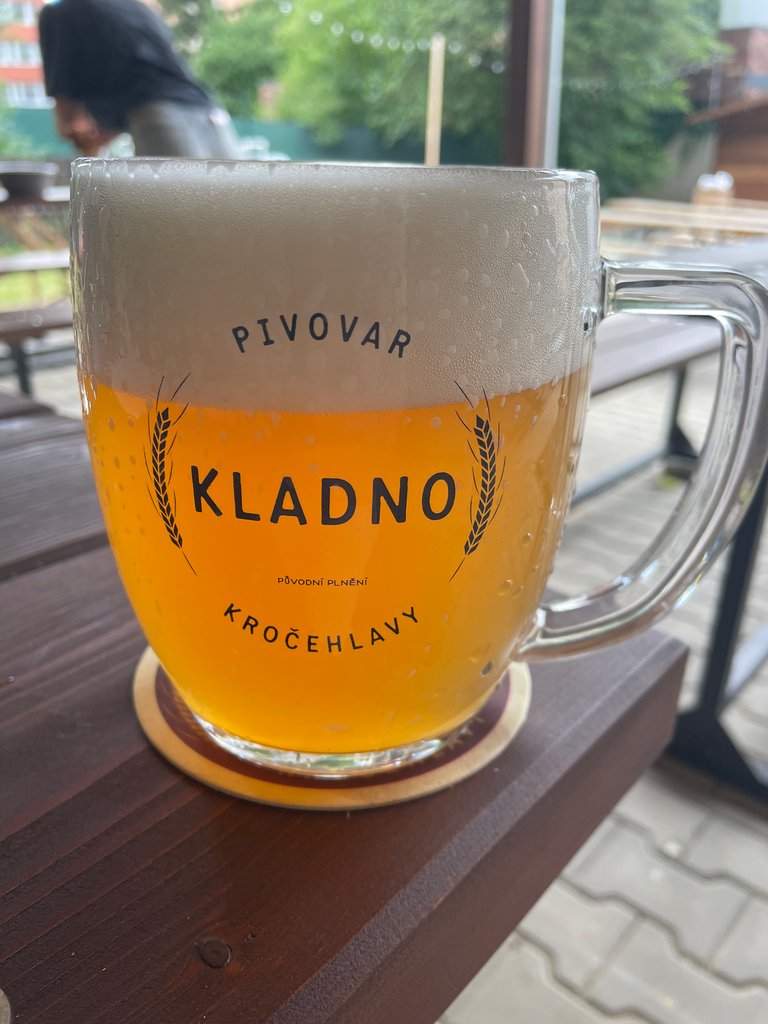
Kladenská Poldi
This Bohemian lager is a tribute to the famous Kladno steelworks and offers a lighter version of the traditional Pilsner beer, the so-called "cyclobeer." With an alcohol content of just 3.5%, it is a smooth beer with a leaning toward a herbal flavor profile. The subtle hop notes just enhance the drinkability of the beer. This is, after all, the intended character of these light beers - they are easy to drink and satisfying in their simplicity.
Pocta kladenským hutím je osmička, takzvané cyklopivo. S 3,5 % alkoholu je to snadno pitelné pivo, které má spíše lehce bylinkové tóny. Jemné chmelové náznaky doplňují souhru chutí a dělají z Poldi hodně pitelné pivo. A o tom je koneckonců tenhle styl především.
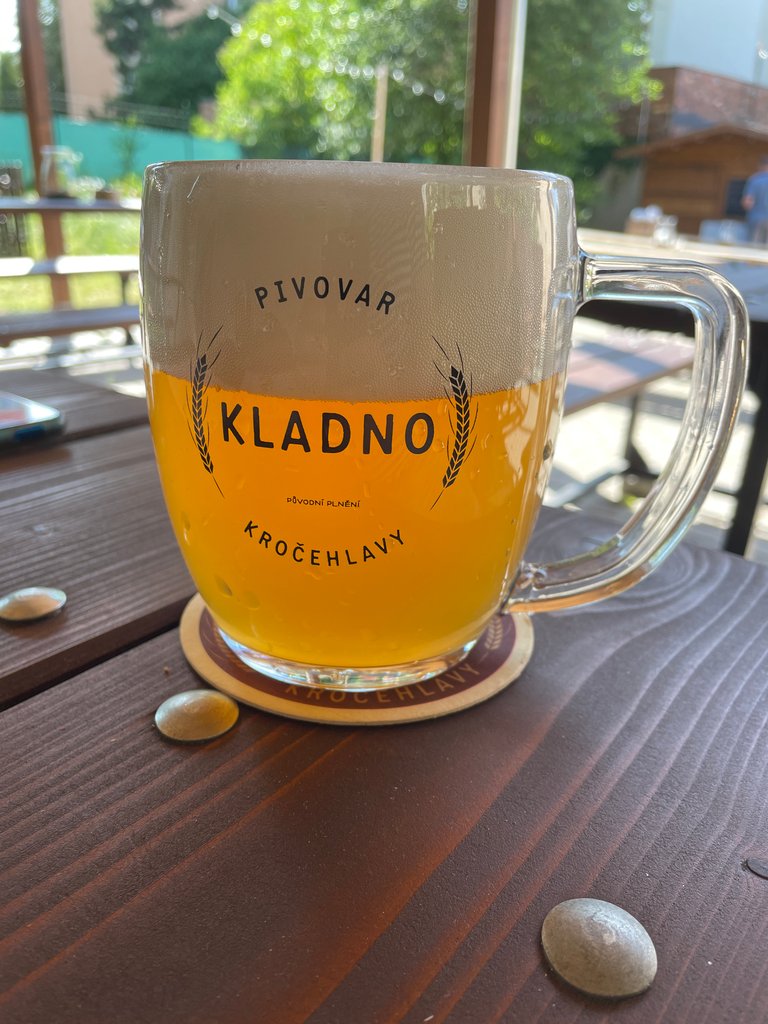
#beersaturday je jedna z mnoha výzev, které tady na Hive existují. A já si myslím, že další, kdo by mohl přispět svou troškou do mlýna, je @shandalar. Mrkni na pravidla a zkus něco napsat!
https://leofinance.io/threads/godfish/re-leothreads-6hnejvwo
The rewards earned on this comment will go directly to the people ( godfish ) sharing the post on LeoThreads,LikeTu,dBuzz.
Wow!
Once again I am whisked away to a brewery in faraway lands via your blog! I know Kladno through my love of hockey and a few players on my favourite NHL teams who came from there or sign there to end their professional careers. SO great to hear a little history and sit for a pint in the mecca of Pilsner!
I think I would like to sample a Kladenské černé.
Yep, you’re right, some of the most famous Czech hockey players were born there. Jaromír Jágr, who you obviously know, bought the local club when he returned home. And he stills play for it the first trier. This guy will never retire!
https://www.rytirikladno.cz/
Oh yah Jagr is a phenom but I am more of a Pleks kinda guy Tomas Plekanec https://www.nhl.com/player/tomas-plekanec-8469521
I know him, of course ;) so you’re a Canucks guy then?
Close! Canadiens from Montreal. Played there almost his whole career and was great.
Oh, ma bad, i knew he used to play for Montreal but i sort of interchanged Canucks/Canadiens. Speaking about Plekanec, he hasn't retired yet either and plays alongside Jágr for Kladno :)
The message of the coaster is really good and could be applied to other goods too, not just to beer ;)
Definitely ;) I believe it is a replica of a coaster from the 1920s or 30s. But you’re right, people should think globally and drink locally, if I may update the saying a bit ;)
Hehehe, a nice update you made 😄
Suited for the #beersaturday ;)
Yay! 🤗
Your content has been boosted with Ecency Points, by @godfish.
Use Ecency daily to boost your growth on platform!
Support Ecency
Vote for new Proposal
Delegate HP and earn more
Promoting our culture is our responsibility by consuming what is locally produced. Thanks for sharing.
I love this post cheers 🍻
Congratulations, your post has been added to Pinmapple! 🎉🥳🍍
Did you know you have your own profile map?
And every post has their own map too!
Want to have your post on the map too?